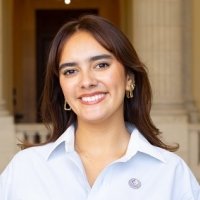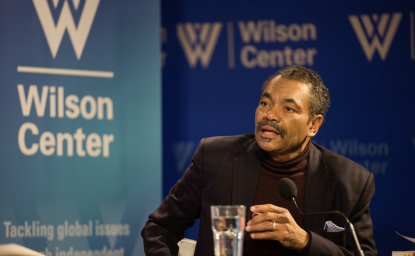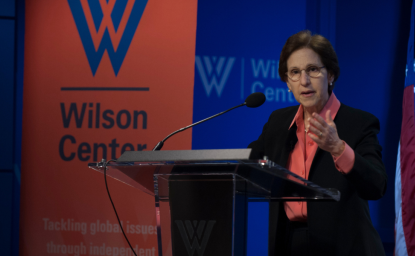
A blog of the Wilson Center
Dr. Guadalupe Correa-Cabrera’s career spans academia, policy research, and hands-on investigation into the social, economic, and criminal dynamics shaping the US-Mexico border. As a scholar with the Wilson Center and an expert in border security and migration, her work brought her face-to-face with communities and criminal networks from Mexico to Central America.
Dr. Correa-Cabrera’s path to studying violence, migration, and organized crime has roots in her experiences growing up in Mexico. Born in the State of Mexico, she moved frequently across the country due to her family’s business. Her father, originally from Michoacán, faced threats from Los Zetas, one of Mexico’s most notorious cartels, which drove her family to leave the area. These personal experiences of family displacement and threat sparked her interest in studying organized crime and its impact on communities.
As she pursued her education, Correa-Cabrera initially studied economics and worked for the Mexican government, including roles in the Ministry of Agriculture and the Ministry of Finance’s International Affairs section. However, her experiences in Mexico’s borderlands and her family’s encounters with cartel violence shaped her commitment to understanding the human costs of organized crime.
“I wanted to understand why my father and brother had to leave their business, and what forces were driving this violence,” she says. These questions led her to research organized crime, border security, and eventually, the vast illicit networks affecting both Mexico and the United States.
After completing her PhD at the New School for Social Research, Dr. Correa-Cabrera accepted her first academic appointment in Brownsville, Texas, the southernmost city on the US border. Living in the borderlands helped her confront the issues she had long sought to understand. Just across the border in Matamoros, Mexico, violence escalated as Los Zetas and other criminal organizations vied for control, with spillover effects impacting both sides of the border.
“I was living four minutes away from a building where bullets crossed the border and hit my university’s gym,” she recalls. “Living at the border was a highly personal experience that drove me to research violence and migration.”
Her work began with studying Mexican drug cartels, especially Los Zetas, which she later detailed in her book Los Zetas Inc. Living near the border exposed her to both the human and policy dimensions of organized crime. She observed how criminal organizations exploited migrants, controlled territories, and threatened local communities. This immersion in border dynamics propelled her to explore the complex intersections of violence, migration, and organized crime.
Dr. Correa-Cabrera’s work gained international recognition when she became a fellow at the Wilson Center’s Mexico Institute, providing a platform for her to present her findings and connect her research with policy circles in Washington, DC.
“I took away from my time at the Wilson Center a deeper understanding of policy’s role in the borderland issues I studied,” she says. The fellowship reinforced her focus on translating her findings into policy briefs and actionable recommendations for policymakers.
For Correa-Cabrera, presenting a full picture of border dynamics is crucial. She critiques the media’s tendency to portray cartels and migrants in one-dimensional, stigmatized narratives that ignore the transnational and multifaceted nature of these issues.
“Too often, coverage focuses only on Mexican criminals and fails to address the broader, interconnected aspects of these problems, including the role of the United States in drug consumption and trafficking networks.”
Researching violent and illicit activities comes with its own set of risks. Correa-Cabrera notes the risks, which are constant.
“You can’t go beyond a certain point or ask too many questions. Safety, for yourself and your sources, is paramount,” she says. Despite these obstacles, she remains committed to shedding light on these issues to inform policy and public understanding.
With her expertise, Correa-Cabrera continues to influence discussions on border policy, offering insights that are informed by rigorous fieldwork and a unique, borderlander’s perspective. Her work is a testament to the importance of nuanced, human-centered research in addressing the complex realities of the US-Mexico border.
This blog was researched and drafted by Samantha Carrillo.
Author


Latin America Program
The Wilson Center’s prestigious Latin America Program provides non-partisan expertise to a broad community of decision makers in the United States and Latin America on critical policy issues facing the Hemisphere. The Program provides insightful and actionable research for policymakers, private sector leaders, journalists, and public intellectuals in the United States and Latin America. To bridge the gap between scholarship and policy action, it fosters new inquiry, sponsors high-level public and private meetings among multiple stakeholders, and explores policy options to improve outcomes for citizens throughout the Americas. Drawing on the Wilson Center’s strength as the nation’s key non-partisan policy forum, the Program serves as a trusted source of analysis and a vital point of contact between the worlds of scholarship and action. Read more


Mexico Institute
The Mexico Institute seeks to improve understanding, communication, and cooperation between Mexico and the United States by promoting original research, encouraging public discussion, and proposing policy options for enhancing the bilateral relationship. A binational Advisory Board, chaired by Luis Téllez and Earl Anthony Wayne, oversees the work of the Mexico Institute. Read more

Explore More in Scholar & Alumni Spotlight
Browse Scholar & Alumni Spotlight
Olufemi Vaughan: Shaping Governance Through Scholarship and Dialogue

Dr. Maurice Jackson: The Sounds of Resistance Throughout History


